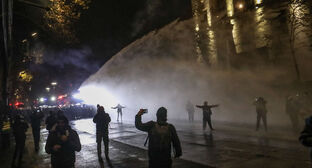14 August 2008, 12:54
Human rights activists: death-roll of Tskhinvali was many times over-scaled by Russian authorities
During the armed conflict, the Tskhinvali city hospital accepted 44 casualties and 273 wounded residents of South Ossetia, the hospital doctors have reported to the employees of the Human Rights Watch (HRW).
Tatiana Lokshina, the HRW researcher for Russia, has told the "Caucasian Knot" correspondent that the majority of wounded persons who had arrived to the hospital were participants of combat operations. Ms Lokshina has also noted that the casualties that arrived to the Tskhinvali hospital were Ossetian nationals; no bodies of Georgians were brought to this medical institution. Moreover, the bodies of Georgian soldiers remained in the city streets till the last day, and only last night, on August 13, they were put into bags - the prosecutor's office is going to work with them.
Earlier, on August 10, representatives of the Human Rights Watch visited the only for that moment field hospital in Northern Ossetia, deployed near Alagir village. A hospital source informed them that from the moment of its opening in the morning of August 9 till the evening of August 10, the hospital accepted 52 wounded persons, "about 90 percent of them were militaries." Also, the hospital was expecting some 170 more wounded persons (20 in heavy conditions) to be transported from the mobile military hospital deployed in the South-Ossetian Dzhava village.
"It is obvious that the total number of casualties cannot exceed this figure of 44 persons by many times," said Tatiana Lokshina.
"The officials couldn't have any other data except for the statistics of medical organizations. In this case it's not clear where the assertions about 1400 and more lost peaceful residents come from," Alexander Cherkasov, board member of the Human Rights Centre "Memorial", is surprised.
The doctors who, according to Ms Lokshina, have operated on their patients all the last days in the hospital of Tskhinvali in "inhuman conditions" assert that practically all the casualties had been brought to them.
The HRW representatives evidence that the dwelling districts of Tskhinvali were really shelled by "Grad" missile systems - the weapon, which is non-selective by its principle: specific damages can be seen in houses, and missile fragments can be found nearby. One shell got into the building of the hospital, after which doctors took all their patients into the cellar.
Indeed, as human rights activists managed to find out, Georgian tanks were really shelling the cellars, where peaceful residents were hiding.
Author: Vyacheslav Feraposhkin, CK correspondent




